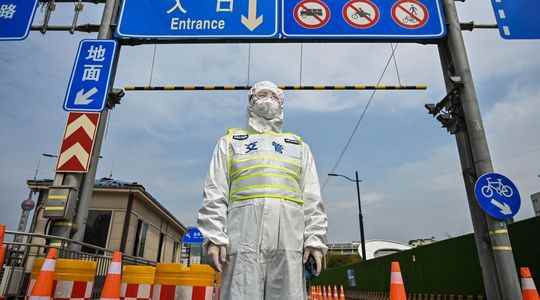After a 40-hour journey that took him from Shanghai to Seoul and then San Francisco, Frenchman Mathieu Laurent, his two-year-old granddaughter and his American wife – seven months pregnant – finally managed to flee the economic capital. Chinese. “We left with just a few suitcases, leaving behind us eight years of life in China; sad but relieved to have been able to escape this hell,” he says.
A hell that began at the end of April, when Shanghai brutally confined its 26 million inhabitants due to an upsurge in Covid cases. Since then, the lack of food, the brutality of health checks and above all the risk of seeing families separated in the event of a positive Covid test have led to the exodus of a large part of the foreigners who were settled in China. “It was too much, we no longer had a choice, my wife could not risk giving birth in her conditions,” he sighs.
Economic downturn
Like him, more and more expatriates have decided to pack up and put an end to their “Chinese dream”. “The rush to China is over, the French are in the process of redirecting their investments towards the United States or Singapore depending on their field of activity”, confirms Grégory Louvel, business lawyer and partner of the firm Leaf , in Beijing.
China has 1,100 French companies representing nearly half a million employees (mainly local staff). “We are inevitably heading towards a sinicization of executives, anticipates an expatriate French manager. In itself, this is not a problem, the risk is to see our Chinese subsidiaries cut off from the realities of the world, without physical contact with headquarters” . Replacements for foreigners are difficult: beyond China’s lack of attractiveness, visas are rare and strict quarantines on arrival frighten families.
“We are also clearly seeing a slowdown in the Chinese economy. If we add to this travel complicated by the health situation, seized supply chains: it is a rather explosive cocktail which explains that many business leaders are leaving”, underlines Maître Louvel.
By the end of the year, the American and European Chambers of Commerce in China anticipate that their expatriate communities, already reduced by two in 24 months, should continue to shrink. The French Consulate plans to depart 20% more French people from Shanghai this summer. This exodus is accompanied by a flight of multinationals. “Only companies that sell directly to Chinese consumers are destined to stay, this is the case for pharmaceutical, cosmetic or food products or those that already have large industrial platforms here, but for the others it’s time to leave. “, emphasizes Grégory Louvel.
Emmanuel Macron raises the issue with Xi Jinping
According to a census dating from April, almost a quarter of the members of the European Chamber of Commerce in China plan to transfer part of their investments to a third country. This is twice as much as two months ago, before the quarantine of Shanghai, the economic capital of the country. 60% of companies anticipate a drop in revenue this year.
On May 10, Emmanuel Macron asked his Chinese counterpart Xi Jinping to “take into account the concerns” of some 24,000 French people living in China and affected by anti-Covid restrictions. The French president notably mentioned “maintaining air connectivity to France, authorizing travel to airports and protecting the best interests of children by avoiding, whatever the circumstances, separating them from their parents. “. The 7,000 French people residing in Shanghai are particularly affected by the strict confinement imposed there since April, while in Beijing travel is limited and many public places closed, as well as schools, restaurants, parks and sites. tourist attractions, such as the Forbidden City, since May 12.
Across the country, more than 370 million people are now subject to a more or less strict form of confinement. “We really have the impression that the worst is yet to come, confides a Frenchman living in Beijing. hotel), or worse in an isolation camp. I can’t impose that on my family and that’s why so many of us want to leave.”
